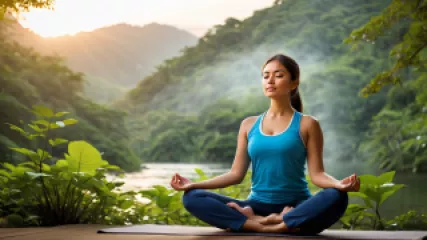Expert Insights: Effective Relaxation Techniques
In this exclusive interview feature, we delve into the world of relaxation techniques with expert insights from Regina Adams, a renowned psychologist and mental wellness advocate. Adams has dedicated her career to helping individuals reduce stress and achieve a state of mental well-being. Join us as we uncover effective relaxation techniques that can transform your life.
The Importance of Relaxation
Before we explore the techniques, it's essential to understand why relaxation is crucial for our overall well-being. In today's fast-paced world, stress has become an integral part of our daily lives. The constant pressure and demands can take a toll on our mental and physical health.
Relaxation allows our mind and body to recharge, rejuvenate, and find balance amidst the chaos. It helps us manage stress, reduce anxiety, improve focus, enhance creativity, and foster a sense of inner peace. Incorporating relaxation techniques into our daily routine is essential for maintaining optimal mental wellness.
The Power of Deep Breathing
One of the simplest yet most effective relaxation techniques is deep breathing. When we're stressed, our breathing becomes shallow and rapid. Deep breathing exercises help slow down our heart rate, lower blood pressure, and activate the body's relaxation response.
To practice deep breathing:
- Find a quiet and comfortable space where you won't be disturbed.
- Sit or lie down in a relaxed position.
- Close your eyes and take a deep breath in through your nose, filling your lungs with air.
- Hold your breath for a few seconds.
- Exhale slowly through your mouth, releasing any tension or stress.
- Repeat this process several times, focusing on each breath and allowing your body to relax.
Deep breathing can be practiced anywhere, anytime, making it an incredibly accessible relaxation technique.
The Art of Meditation
Meditation is a powerful technique that has been practiced for centuries to promote relaxation and inner peace. It involves focusing your attention and eliminating the stream of thoughts that may be causing stress or anxiety.
To begin your meditation practice:
- Find a quiet and comfortable space.
- Sit in a relaxed position, keeping your back straight.
- Close your eyes and take a few deep breaths to center yourself.
- Focus your attention on a specific object, word, or mantra.
- Allow thoughts to come and go without judgment, gently bringing your focus back to your chosen point of focus.
- Continue this practice for a designated period, starting with short sessions and gradually increasing the duration as you become more comfortable.
Regular meditation practice can enhance self-awareness, reduce stress, and cultivate a sense of calm and clarity.
The Healing Power of Nature
Connecting with nature is a powerful way to find relaxation and restore our mental well-being. Spending time outdoors, surrounded by trees, plants, and fresh air, can have a profound impact on our stress levels.
Here are a few ways to incorporate nature into your relaxation routine:
- Take a walk in a park or nature reserve.
- Sit by a lake or beach and listen to the sounds of nature.
- Practice outdoor yoga or meditation.
- Engage in gardening or plant care.
- Plan a weekend getaway to a scenic location.
Immersing yourself in nature allows you to disconnect from the digital world and reconnect with the present moment, promoting relaxation and mental clarity.
The Benefits of Progressive Muscle Relaxation
Progressive muscle relaxation is a technique that involves tensing and then relaxing different muscle groups to release tension and promote deep relaxation. This method is particularly effective for individuals who carry physical stress in their bodies.
To practice progressive muscle relaxation:
- Find a comfortable position, either sitting or lying down.
- Start with your toes and gradually work your way up through each muscle group.
- Tense each muscle group for a few seconds, then release and relax completely.
- Focus on the sensation of relaxation as you release the tension.
- Continue this process throughout your entire body, from your feet to your head.
Progressive muscle relaxation can help alleviate muscle tension, reduce anxiety, and induce a state of profound relaxation.
The Therapeutic Benefits of Aromatherapy
Aromatherapy utilizes the powerful scents of essential oils to promote relaxation, improve mood, and reduce stress. The inhalation or topical application of essential oils can have a profound impact on our emotional and physical well-being.
Some popular essential oils for relaxation include:
- Lavender: Known for its calming and soothing properties.
- Chamomile: Promotes relaxation and helps alleviate anxiety.
- Bergamot: Uplifts mood and reduces stress.
- Ylang Ylang: Induces a sense of tranquility and calm.
To incorporate aromatherapy into your relaxation routine, you can:
- Use an essential oil diffuser to fill the air with relaxing scents.
- Add a few drops of essential oil to your bathwater.
- Create a calming massage oil by diluting essential oil with a carrier oil.
- Apply a few drops of essential oil to your pillow before sleep.
Aromatherapy is a delightful and sensory way to relax and enhance your overall well-being.
The Path to Lasting Relaxation
While these relaxation techniques offer significant benefits on their own, combining multiple techniques can amplify their effectiveness. Experiment with different methods and discover what works best for you.
Remember, relaxation is not a one-time event but rather a lifelong journey towards mental wellness. By incorporating these techniques into your daily routine, you can cultivate a state of relaxation and equip yourself with invaluable tools for stress reduction and overall well-being.
"Relaxation is not something that can be achieved overnight; it is a continuous practice that requires commitment and self-care." - Regina Adams
By prioritizing relaxation in our lives, we can experience the profound benefits it offers. Start implementing these effective techniques today and embark on a transformative journey towards mental wellness and inner peace.






